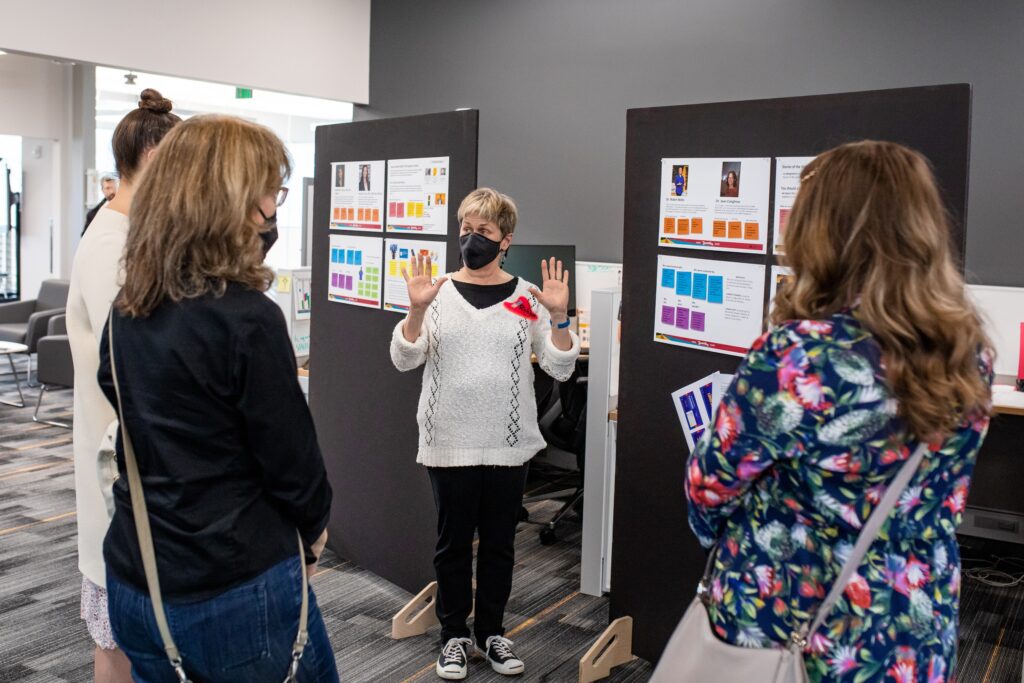
As we dig our heels into the 2023-2024 academic year, UWM Professor of Theater Dr. Robin Mello has been attracting her students with innovative methods, encouraging them to step out of their comfort zones and embrace the role failure plays in the creative process. This past October, Professor Mello traveled to the UK to the University of Exeter’s Innoplay Research Center to facilitate and present a storytelling experience alongside holding a master class for instructors across academic campuses. The LEC’s Program Manager, Tiera Trammell, sat down with Professor Mello to talk with her about her experience.
“One of the basic things that is essential to being human, to being, well, complete and getting your goals done, is how you narrate. How you tell your story with other people and how you connect.”
Professor Mello has been teaching storytelling for more than 30 years. One of the key aspects of her teaching style is her commitment to collaborative learning. Instead of following the traditional lecture style format, she fosters an environment where students actively contribute to the learning process. Through group exploration and interactive discussions, she encourages students to share their unique perspectives and ideas. Her students, of course, are initially thrown off by this approach; they expect the standard syllabi and competencies they have in other courses. The initial ambiguity causes some hesitation. “’What, there’s no test?’ they ask,” says Mello. She encourages her students to be willing to “try things on.” Next week’s lesson involved her Theater: 260 course learning how to juggle.
“Ambiguity is part of the creative process. You have to explore.”
Professor Mello attributes her arts and acting background to being the start of her collaborative approach to teaching.
“There is a value of being with other people and trying things together, even if they are not always successful.”
She has continued her practice of collaborative thinking over the course of her career. One example of this is her status as an LEC Teaching Fellow beginning in 2020. This program encourages UWM faculty to integrate entrepreneurial thinking into their coursework to enhance students’ creative capabilities. After trying practices out and seeing which activities worked, they began creating new pathways of thinking which led them to new discoveries. It was through this fellowship that Professor Mello was able to attend Stanford’s d.school along with her co-teacher Dr. Jean Creighton, Director of the UWM-Planetarium, to develop creative routes and practice design thinking. While there, Mello was introduced to Dr. Maarteen Koener, Co-Director of the Innoplay Center, and the two began forming ways for them to create new programs to contribute to their students’ development – and theirs as well.
“It’s makes it safe to call things out that looks like mistakes but are just part of exploration.”
The Innoplay Center conducts unique research in the Arts & STEM fields to help develop ways to support health professions, community organizations, teaching, and leadership, as well as serving as a premier location for innovators and educators. Over the past several years, Professor Mello has observed her students’ transition from “technological mediated spaces,” to face-to-face interaction. Robin’s contribution to the workshops included her own research focused on how incorporating play in storytelling and other courses, “allows for essential human development and is a transformative tool for building coherent and diverse communities and entrepreneurs,” a connection that has been lost or replaced due to isolation over the past few years.
“Lots of people I am working with are in a space where they want to reengage. They are looking for engagement.”
When asked what’s changed in her approach with students the most since she began teaching, Professor Mello notes, “I’m still growing up…but really, it’s complex. Part of what has changed is what students think about the world and how they’re engaging in the world.” Being able to bring in the world around them and reflect what students see in everyday life has enabled Professor Mello to make deeper connections with students than relying on traditional methods of teaching. It’s important that the students’ perceptions are recognized and integrated. This human design approach begins with empathy, a core element of the design thinking process.
The Lubar Entrepreneurship Center provides the perfect backdrop for Professor Mello’s innovative approach. At its core, this environment celebrates creativity, risk taking, and the entrepreneurial spirit. Students not only learn the art of storytelling but have access to all the resources the Center has to offer. This semester, eight courses are being taught in the building ranging from art to engineering – all of which in some way apply entrepreneurial and design thinking.
Professor Mello is hopeful of new methods of teaching and reaching her students through storytelling and play. “I’m not retiring, I’m reengaging.” She looks forward to new ways to test students on their creative process, allowing them to fail and exploring how to move through it. She laughs thinking about next week’s juggling exercise.
“It teaches you to fail before you succeed. You have to drop a lot of objects before you get them to stay in the air. And you can expect they won’t stay there.”
Recognizing failure as part of the creative process is key to entrepreneurial thinking. It encourages participants to not get hung up on the “what ifs” or “win or fail” mindset. Through figuring out what doesn’t work, you have new ways to test what possibilities exist. The process is key to learning. Robin Mello wishes to engage more areas on campus and tear down the silos that confine students and faculty to their designated buildings. She encourages the act of learning other stories and problems in the ever-changing world we inhabit. Through this act, the possibility of creation is beyond measure.
“If you are successful in storytelling with other people, building relationships with other people, adding some play and some joy, that is significant.”
Thank you for your work and engagement at UWM, Professor Mello! We look forward to seeing what you do next.